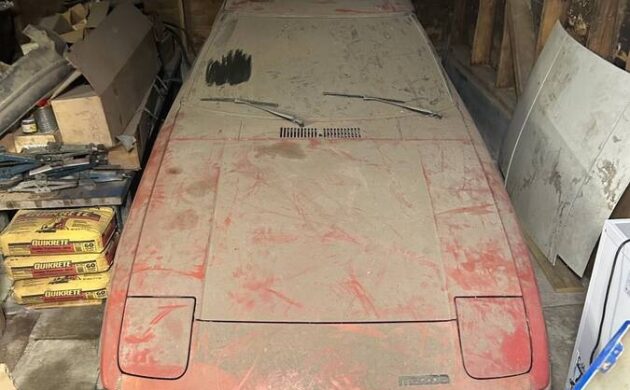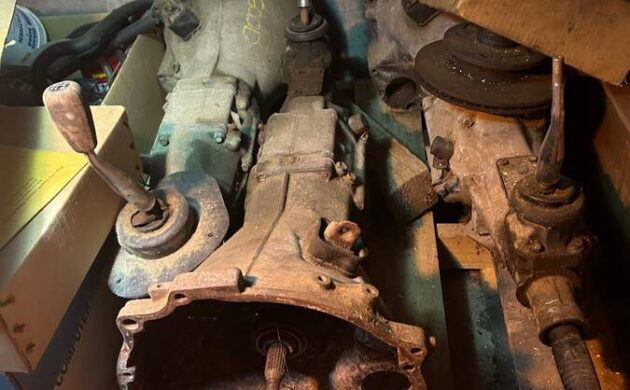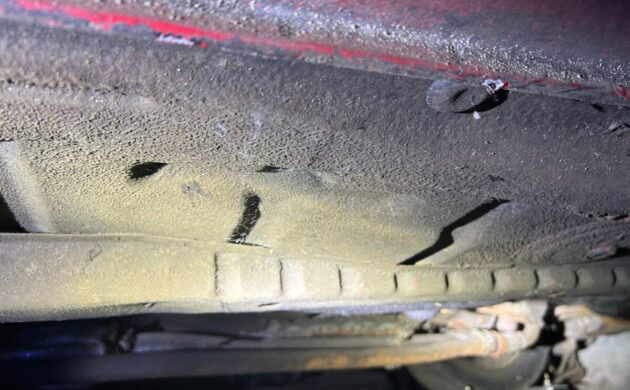Dust for Free: 1979 Mazda RX-7 Project
The road to the Wankel-engined car is cluttered with hits and misses. The first rotary-powered car was a prototype Skoda 1000 made in the late 1950s; the engine was less than satisfactory, so production cars featured a conventional four-cylinder. Next up, NSU swung for the fences in 1963, installing a single rotor motor in its Spider. The motor brought NSU to ruin: the rotor seals were imperfect and effectively chewed up the chamber, causing endless warranty claims. Meanwhile, Curtiss Wright popped a Wankel into a Mustang; Citroen built its Wankel-powered M35 and later, the Birotor; Mercedes tried with its C111; and Chevrolet joined the trend with its concept car, the Aerovette. But only Mazda made the Wankel work – at least for a while. Applying dedicated engineering talent to the science of rotary power, Mazda was able to ameliorate the sealing issue and a number of other niggling problems, introducing a twin rotor in its Cosmo for 1967. The sexy Cosmo led to the RX-7 in 1978. Here on craigslist is a 1979 Mazda RX-7 project car with an asking price of $3500. The car will need to be towed away from Francestown, New Hampshire. Thanks to Mitchell G. for this dusty tip!
The RX-7 came along just as Porsche confused the market with its 924, Datsun had bloated the 240Z into a luxury car, and the MGB was doddering to its grave. Consumers were eager for the wedge-y sports car with its exotic pop-up headlamps and snappy performance. (The RX-7 was my first car, and I thought it was the bee’s knees!) The early high-revving twin-rotor motor produced 100 hp, propelling the car from zero to sixty in just over 9 seconds. The “S” version came with a four-speed and no side moldings; the “GS” offered more color choices, side moldings, and a five-speed (that’s the one I couldn’t afford). This example is a GS and it comes with its own seized motor, a few motor cores, three five-speed transmissions, and ancillaries.
Encouragingly, the underside is dry and seems rust-free. The seller says that both doors have some rust but he supplies a passenger door that’s clean. Other parts include glass, interior trim, one seat, and three steering columns. Early RX-7 parts are available from a few vendors, but later cars do enjoy better supplies.
The RX-7 ushered Mazda onto the international stage. More than 71,000 copies were sold in its first year. RX-7s won the Gt-2 SCCA National Championship in ’83, ’85, and ’90. It won in IMSA and it won driver’s championships for eight years running. Like so many cars from a few decades ago, the RX-7 has found its niche with collectors and prices have started to rise, emphasis on “started”. A nice early example can still be had for around $12,000, but these relatively low prices may not last much longer. This project car offers an even cheaper route to ownership if the buyer is able to sort the mechanicals. Anyone else have fond memories of the RX-7?
Auctions Ending Soon
 2006 Jeep Wrangler SportBid Now1 days$11,750
2006 Jeep Wrangler SportBid Now1 days$11,750
 1974 Datsun 260ZBid Now3 days$750
1974 Datsun 260ZBid Now3 days$750
 2010 Proterra Ecoliner PrototypeBid Now3 days$200
2010 Proterra Ecoliner PrototypeBid Now3 days$200
 1960 Austin Healey SpriteBid Now6 days$500
1960 Austin Healey SpriteBid Now6 days$500
 1976 Cadillac Coupe DeVilleBid Now6 days$1,000
1976 Cadillac Coupe DeVilleBid Now6 days$1,000





Comments
Comes with three 5 speed transmissions. So it’s a 15 speed, right? Maybe it’s time for a piston engine swap, but not an LS. I think half an LS should do it. Blueprint Engines is considering a 4 cylinder that uses a LS head, the prototype makes about 300 hp.
Wow, I hadn’t heard about the Bluprint Engine and that one might be a nice fit. It is a NH car though, so I don’t know how much cancer in the car there would be. Seeing the car, I’m guessing the engine would need 100% rebuild at a minimum.
I had a 1980 RX-7 in black that I bought new. I loved that car! Everywhere I drove it attracted attention … perhaps because I lived outside of Detroit and people tended to know their cars. I only drove it in nice weather and put 69,000 miles on in 10-years before it languished in the garage for another 10. In a moment that I can only describe as “temporary insanity” I offered the car to my 17-year-old nephew with a stern warning to always check the engine oil. Within six months he blew the engine and sold the car without my knowledge. Now every time I see an RX-7 for sale for more than what I paid for mine new I want to chew glass!!
The fuel injected ones in the mid 80’s were so much better.Customer at our shop had an 85 or 6 top of the line one in light yellow.Thing would rev up to 8-9000 rpms no problem , it revved like a motorcycle engine.It was a neat little car.Wouldn’t mind driving one again for fun which is was a fun little car to test drive.Never drove a car that could rev so high.They were easy to change spark plugs on I remember that.He really never had a problem with it we’d just do maint.for him.This one looks solid underneath. Sounds like a deal with all the spare parts if you’re into em.
There was no reason to shift at 8000 to 9000 RPMs, that was way past the power band of the engine, and past the redline.
Unless it is a modified 13B P-port motor. As for the 12A, 7000 rpm shift point is fun and very effective. Brief forays into the 7000-8000 rpm range will not hurt anything. Typical driving there is seldom any point in going beyond 6000 rpm. The 12A engine actually behaves wonderful at very low rpms and can be lugged down without the shuddering typical of a piston engine.
Owned 3rd one sold in Massachusetts in fall of 1978 and didn’t stop till I sold my last 91 ragtop (I miss that car). Loved when you hit that redline, it beeped at me. I do agree that the holly carb on the early cars were ok, but the fuel pump couldn’t keep up. The fuel injection was alot more smooth in later cars.
To the best of my knowledge the FB all had the Nikki 4 barrel carb. If you had a Holley then it was a conversion. My opinion is that a carb conversion might make sense on the track. But for the street, it is hard to beat a well calibrated Nikki on a 12A engine.
It was probably an 85. 86 was the FC chassis. I had fuelie 84 five letter rx-7 and it was great. They are reliable if you warm them up properly and keep on top of the oil. Mine had 160k when I sold it, and still had great compression. And there wasn’t a day in it’s life in my ownership where it didn’t ring the buzzer at me.
This car needs a 13b S4 or S5 engine from an FC dropped into it. That would absolutely scream!
This one was a 5 letter too if you mean the letters on the deck lid.I’ll never forget the guy who would drop it off for his wife said those 5 letters cost me 5k extra. He was vice president of United airlines world headquarters right across the street from our shop.Some one else bought the property recently .They just knocked it down along with old 60s brick 3 flats the pilots and stewerdeses used to use for living quarters when there were layovers. and are building a huge warehouse there now.Probably Amazon. That rx7 test drive was 35 years ago.Left a lasting impression on me.It was a blast!
Dust is ok, but I prefer my chicks for free.
Ha ha, you got the reference!
Yes I still have one, a 1982 RX7 model S. Great fun, and reliable if you know what your doing. I am not surprised that the bottom looks that good, mine does too, and it spent it’s life in Upstate NY and the north part of KY. The places to look for rust are the lower seam of both doors, the rocker panels just ahead of the rear wheels, and the rear fender arches. Fortunately the structural stuff on these are not prone to rust. For all the parts included, the price is reasonable. However anyone buying this should plan on a near complete rebuild. The rotary engine is more than half of the enjoyment of drive the FB RX7. Therefore I would limit engine swaps to only later generations of rotary engines. If you prefer pistons, you have plenty of other options. IMHO
Had a 79 that I autocrossed for a few years. Rule of thumb was that if the buzzer wasn’t going off, you were going too slow. These cars responded extremely well to very basic mods. Good struts/shocks, stiffer springs, thicker front sway bar (put a rear bar on it and you’d pooch the clutches in the diff.), freer flowing exhaust, and good tires. Interesting side bar is that a lot of the suspension bushings from a Fox Mustang fit. Cheaper and better selection. Can’t imagine these will ever command near the same values as a first year 240Z though.
I also use to autocross and hillclimb my 79 in the early days. They couldn’t figure out what class to race us in so we’d clean up in pretty much any class they stuck us in. Toward the end, they’d have us against TR8s, Corvettes, Camaros and we’d still kick butt against those guys due to their weight.
I had a 79 in Germany until I wrecked it on an icy bridge. I should have kept it in the garage during the winter. Imagine flying down the road at 100MPH and yanking it into a 90 degree turn, down shift to 2nd and pop the clutch and your still doing 90 MPH. Fastest car, most agile car I ever owned. Even better than the 86 RX7 I bought when I got stateside. I couldn’t fit in the last iteration sadly. Those are beautiful.
I’ve got an 84 GSL… In an uninspiring “Havana Brown Metallic” Bought it after it had been in storage for about 10 years… Interesting car… fun to have. However, at 2000 lbs and ~100hp, by today’s standard its quite slow… Honda Fits will win in a drag race. …and below 3000 rpm there is no torque… It is a “momentum” car. Also amazingly thirsty for its size and weight… 20 mpg is about the best you’ll get. My Chevy PU does better. At get lots of comments on it… as here in the northeast USA you never see them anymore.
??? I’ll take exception on the torque statement. You refer to an 84-GSL (not an 84-GSL-SE). Maybe not tons of low end torque. But unless you have bridge-port or other modifications. Then a 12A in good tune should be able to be lugged down to 300 rpm and still pull without chugging. Driving in traffic should require minimal clutch slippage (much less than most 4-cylinder cars). Things to pay attention to, failing ignitors, vacuum & centrifugal advance, vacuum leaks on carb circuits, or time for a carb rebuild. I’m just trying to be helpful, and maybe dispel a few common generalizations.
Yup… its a GSL… 12A… 95k mi. Oh I can lug it down and “pull without chugging”… but your not getting anywhere fast. It will do 0 to 60 in the 9 – 10 second range (bouncing the tach off the red line) which is about what contemporary tests saw… so I’m guessing its not down on power. Even though the oil metering pump is still working fine, I run a ~350/1 premix most of the time… just to be kind to the aging apex seals.
Years and years ago I had a neighbor with a ’79 or ’80 that did all the “go fast” bridge-port mods with a Holley (I think) carb and fancy headers… Had a lot of power at high rpm… fast… and loud as h—… but it was miserable to drive on the street. Absolutely nothing below 4000-4500 rpm… He had a pretty steep uphill getting out of his driveway… every morning I could hear him slipping the clutch trying to get out… Silly…
I also add about the same amount of pre-mix to my 1982 RX7. I am currently just under 130k miles on my engine. About 2 years ago I had a leading ignitor fail, and subsequently converted to 3 coils with GM style ignitors (DLDF). Runs great for a 41 year old engine with 128k miles on it. The redline buzzer was removed over 30 years ago. Often will take it up between 7000-8000 rpm on the first two shifts. Aside from those few milliseconds at that rpm, it spends most of its life well below 4000 rpm. As for fuel economy, I usually still average somewhere between 20 to 23 mpg.